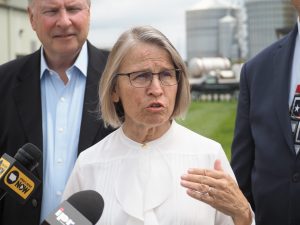NEWTON — U.S. Rep. Mariannette Miller-Meeks spoke Thursday in favor of carbon dioxide pipelines as a way to aid Iowa’s ethanol production industry with an environmentally conscious impact. The Iowa Capital Dispatch reports Miller-Meeks, the Republican representative for Iowa’s 1st Congressional District, spoke about pipelines and other renewable fuel efforts supported by the Conservative Climate Caucus. She, alongside Republican Reps. Randy Weber of Texas, Doug Lamborn of Colorado and Brett Guthrie of Kentucky — fellow caucus members — visited the Chevron Renewable Energy Group in Newton as part of a trip to Iowa focused on increasing affordable, low-emission energy options.
Following a tour of the biodiesel production facility, the Iowa Republican said Iowa is a “forerunner and a leader” in enacting a conservative vision for climate-conscious energy production through the use of renewable fuels, wind and solar energy.
The caucus wants to explore ways to encourage the adoption of new climate-conscious technology and techniques, but Republicans encourage “market-based solutions” rather than government requirements, Miller-Meeks said. She criticized President Joe Biden’s administration for its approach to climate change solutions, citing the Environmental Protection Agency’s rules on issues like coal and natural gas-fired power plants and tailpipe emissions.

U.S. Rep. Mariannette Miller-Meeks spoke about the conservative climate caucus during a visit to the Chevron Renewable Energy Group facility in Newton Aug. 15, 2024. (Photo by Robin Opsahl/Iowa Capital Dispatch)
As the Republican lawmakers seek to bolster alternative energy sources and production in the U.S., Miller-Meeks said carbon dioxide pipelines are one way to lower the carbon intensity score of ethanol, which she said in turn makes the industry competitive globally as American ethanol producers compete with countries like Brazil.
The Summit Carbon Solutions pipeline project has been a major point of contention for Iowans in both parties as the company seeks to build a network in five states, including Iowa. Much of the pushback over the project has come from the use of eminent domain that would force landowners to allow the pipeline to be built through their land even if they do not grant the company voluntarily easements.
A group of state Republican lawmakers, as well as conservation groups, counties and property owners, have filed requests for reconsideration with the Iowa Utilities Commission on the three-person panel’s decision to issue a permit to Summit in Iowa.
Miller-Meeks said the use of eminent domain is a “state issue, not a federal issue,” but said the ideal is for a “limited amount of involuntary easements” to be used in pipeline projects. She also said it was important to remember that pipeline companies will not be taking or owning the land.










